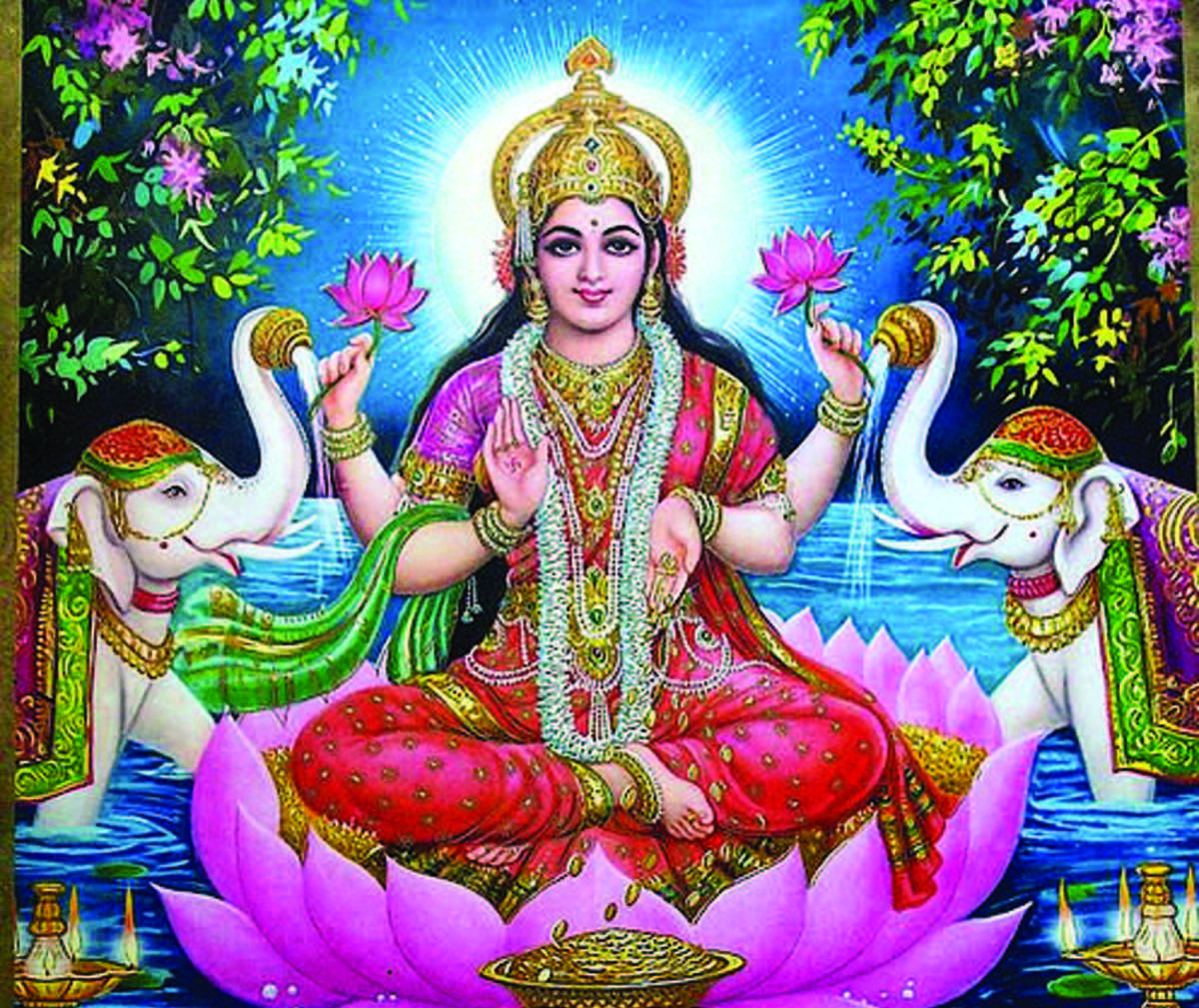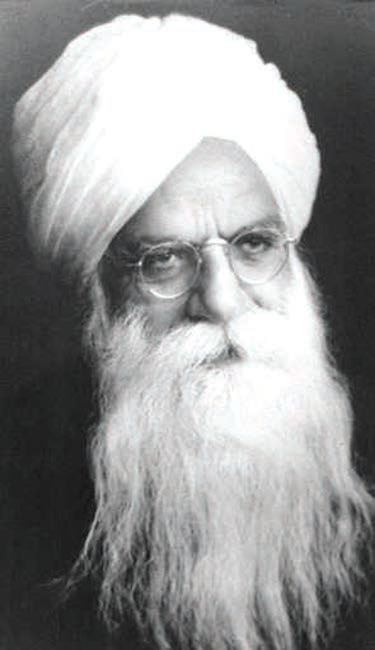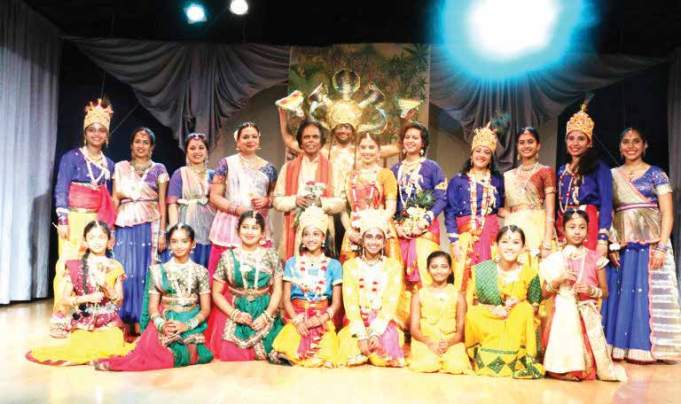
Goddess Lakshmi means Good Luck to Hindus. The word ‘Lakshmi’ is derived from the Sanskrit word “Laksya”, meaning ‘aim’ or ‘goal’, and she is the goddess of wealth and prosperity, both material and spiritual.
Lakshmi is the household goddess of most Hindu families, and a favorite of women. Although she is worshipped daily, the festive month of October is Lakshmi’s special month. Lakshmi Puja is celebrated on the full moon night of Kojagari Purnima (October 8).
The Lakshmi Form
Lakshmi is depicted as a beautiful woman of golden complexion, with four hands, sitting or standing on a full-bloomed lotus and holding a lotus bud, which stands for beauty, purity and fertility. Her four hands represent the four ends of human life: dharma or righteousness, “kama” or desires, “artha” or wealth, and “moksha” or liberation from the cycle of birth and death.
Cascades of gold coins are seen flowing from her hands, suggesting that those who worship her gain wealth. She always wears gold embroidered red clothes. Red symbolizes activity and the golden lining indicates prosperity. Lakshmi is the active energy of Vishnu, and also appears as Lakshmi-Narayan -Lakshmi accompanying Vishnu.
Two elephants are often shown standing next to the goddess and spraying water. This denotes that ceaseless effort, in accordance with one’s dharma and governed by wisdom and purity, leads to both material and spiritual prosperity.
A Mother Goddess
Worship of a mother goddess has been a part of Indian tradition since its earliest times. Lakshmi is one of the mother goddesses and is addressed as “mata” (mother) instead of just
“devi” (goddess).
As a female counterpart of Lord Vishnu, Mata Lakshmi is also called ‘Shri’, the female energy of the Supreme Being. She is the goddess of prosperity, wealth, purity, generosity, and the embodiment of beauty, grace and charm. The importance attached to the presence of Lakshmi in every household makes her an essentially domestic deity. Householders worship Lakshmi for the well being and prosperity of the family. Businessmen and women also regard her equally and offer her daily prayers.
On the full moon night following Dusshera or Durga Puja, Hindus worship Lakshmi ceremonially at home, pray for her blessings, and invite neighbors to attend the puja. It is believed that on this full moon night the goddess herself visits the homes and replenishes the inhabitants with wealth. A special worship is also offered to Lakshmi on the auspicious Diwali night.
The 8 Forms of Lakshmi
Just as the Mother Goddess Durga has nine appellations, her daughter Lakshmi has eight different forms. This concept of Goddess Lakshmi in her eightfold form is referred to as the Ashta-Lakshmi.
Lakshmi is also considered a Mother Goddess when it comes to providing wealth in its 16 forms: Knowledge, intelligence, strength, valor, beauty, victory, fame, ambition, morality, gold and other wealth, food grains, bliss, happiness, health and longevity, and virtuous off-springs.
The eight forms of Ashta-Lakshmi are believed to fulfill these human necessities and desires through their individual nature and manifestations.
The eight divine forms of Goddess Lakshmi or Ashta-Lakshmi comprises:
Aadi-Lakshmi (The Primeval Goddess) or Maha Lakshmi (The Great Goddess)
Dhana-Lakshmi or Aishwarya Lakshmi (The Goddess of Prosperity and Wealth)
Dhaanya-Lakshmi (Goddess of Food grains)
Gaja-Lakshmi (The Elephant Goddess)
Santana-Lakshmi (The Goddess of Progeny)
Veera-Lakshmi or Dhairya Lakshmi (The Goddess of Valor and Courage)
Vidya-Lakshmi (The Goddess of Knowledge)
Vijaya-Lakshmi or Jaya Lakshmi (The Goddess of Victory)
Kojagari Lakshmi Puja
Kojagari Lakshmi Puja is performed at most of the Bengali Hindu households in West Bengal. Devi Lakshmi, the Goddess of wealth and prosperity is worshipped on a full moon day of autumn, more precisely in the month of ‘Ashwin’ according to Bengali calendar. The day is known as ‘Kojagori ‘or ‘Sharad Purnima’.
Legend of the Festival
Hindus believe that on the day of Kojagori purnima, Goddess Lakshmi visits every household asking ‘Kojagori?’ which means ‘Who is awake?’ in Bengali. One, who is found awake throughout the night waiting for the Goddess, receives her blessings and his/her household fills with affluence and prosperity. Hence devotees spend the night sleepless singing, playing or chatting. According to Hindu mythology, Devi Lakshmi was born on Sharad Purnima which is why this auspicious day has been assigned for worshipping her. Kojagari Purnima is also celebrated in Orissa as Kumar Purnima and in Gujrat as Sharad purnima.
Celebration and Rituals of Festival
Kojagari Lakshmi Puja is popularly celebrated in West Bengal to offer prayers and devotion to Devi Lakshmi. The Goddess of beauty, wealth and good fortune descends on earth to bestow her devotees with everlasting affluence. Bengalis perform Lakshmi Puja at night although the preparation continues throughout the day. They decorate homes with articulate ‘Alpana’ or ‘Rangoli’ and cook special ‘Bhog’ (various vegetarian dishes to be offered to the Goddess). Offerings for the Devi include Bengali specialties like ‘Narkel Naru’, a sweet prepared from coconut crumbs, ‘Khichuri’, delicious preparation of mixed rice and dal and ‘Payesh’, another delicious Bengali dessert prepared with milk, rice, sugar and dry fruits. Puja is offered after a daylong fast and during the puja, devotional songs are sung and ‘Bratakatha’, stories about Goddess Lakshmi’s munificence are told. Men and women wear traditional Bengali attire ‘Sari’ and ‘Dhoti-kurta’ respectively.
Significance of Festival
Bengalis are known for their festivities and devotion towards Gods and Goddesses. Kojagari Lakshmi Puja comes in between Durga Puja and Kali Puja which further enhances the festive celebrations in the mean time. Clay diyas are lit to rule away all gloom and evil spirits. The festival exemplifies arrival of fortune and happiness to the household.
This page is sponsored by
AARRIISSHH SSAAHHAANNII New York Life Insurance Agent
Call For Insurance Quotes
Sahanis, Arish, Shiv, Priya 718 271 0453
Serving Since 1972
sahani108@gmail.com





Be the first to comment